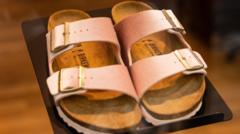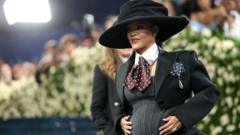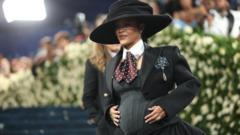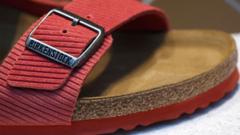The ruling signifies a setback for Birkenstock in its fight to protect its design from knock-offs amid rising popularity.
Birkenstock Sandals Fail to Qualify as Art in German Court Ruling

Birkenstock Sandals Fail to Qualify as Art in German Court Ruling
A German court determines iconic sandals cannot be classified as artistic creations under copyright law.
Birkenstock sandals may be trendy, but a recent German court ruling has concluded that they do not qualify as works of art. The iconic footwear brand sought to secure copyright protection for its cork-soled sandals to fend off competitors selling imitation versions. However, the judge ruled against the company's claim, stating that the sandals have a functional design rather than being artistic creations.
Once overlooked for their practicality, Birkenstocks have seen a surge in popularity, especially following actress Margot Robbie's appearance in a vibrant pink pair during the climactic scene in the summer blockbuster film, Barbie. The sandals, known for their contoured footbed, have evolved since their initial leather design in the 1960s into a range of colors and styles praised for their comfort and durability.
Birkenstocks, which had once lost their appeal on the fashion scene, received a significant endorsement from supermodel Kate Moss in the 1990s and have been spotted on celebrities at major events, including the Academy Awards. After going public on the New York Stock Exchange in 2023, Birkenstock achieved a valuation of approximately $8.6 billion, double its worth from two years prior.
The recent surge in demand has led to an influx of counterfeit products, prompting the brand to pursue copyright protection under the belief that it represents an "iconic design." However, under German law, a key distinction exists between design and art: while designs are utilitarian, artwork must exhibit a notable level of creativity.
In this case, the presiding judge, Thomas Koch, found Birkenstock's claims to be "unfounded," stressing that true artwork requires a certain degree of individual creativity to qualify for copyright protection, which lasts for 70 years after an artist's death, compared to the 25-year limit on design. With founder Karl Birkenstock still alive, their appeal for artistic classification has been rendered moot.
Once overlooked for their practicality, Birkenstocks have seen a surge in popularity, especially following actress Margot Robbie's appearance in a vibrant pink pair during the climactic scene in the summer blockbuster film, Barbie. The sandals, known for their contoured footbed, have evolved since their initial leather design in the 1960s into a range of colors and styles praised for their comfort and durability.
Birkenstocks, which had once lost their appeal on the fashion scene, received a significant endorsement from supermodel Kate Moss in the 1990s and have been spotted on celebrities at major events, including the Academy Awards. After going public on the New York Stock Exchange in 2023, Birkenstock achieved a valuation of approximately $8.6 billion, double its worth from two years prior.
The recent surge in demand has led to an influx of counterfeit products, prompting the brand to pursue copyright protection under the belief that it represents an "iconic design." However, under German law, a key distinction exists between design and art: while designs are utilitarian, artwork must exhibit a notable level of creativity.
In this case, the presiding judge, Thomas Koch, found Birkenstock's claims to be "unfounded," stressing that true artwork requires a certain degree of individual creativity to qualify for copyright protection, which lasts for 70 years after an artist's death, compared to the 25-year limit on design. With founder Karl Birkenstock still alive, their appeal for artistic classification has been rendered moot.






















